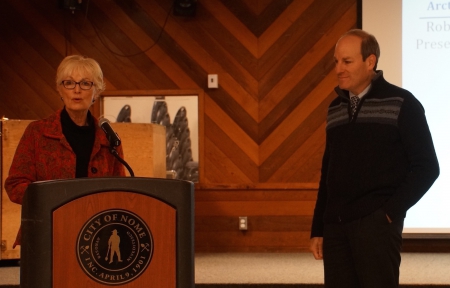By: John Farrell, USARC Executive Director
The U.S. Arctic Research Commission (USARC) held its 104th meeting on 24-26 August 2015 in Anchorage and Nome, Alaska. The primary purpose of the meeting was for commissioners and staff to hear directly from subject matter experts on a wide range of Arctic research topics. The meeting was also an opportunity for the commission to share with Alaskans the content of the commission's biennial "Report on the Goals and Objectives for Arctic Research 2015-2016," was released earlier in the year. The agenda for the three-day meeting is available here.
The half-day session in Anchorage focused on human health, specifically mental and behavioral health including suicidality. Alaska has the highest rate of suicide per capita in the country. It's twice the national rate, and the rate among Alaska Natives is nearly three times higher than the national average. Young males are the demographic at highest risk. Four recent deaths in Hooper Bay are but the latest.
The commission heard from Commissioner Valerie Davidson, of the Alaska Department of Health and Social Services, as well as experts from the Mat-Su Health Foundation, the Alaska Mental Health Trust, the National Institute of Mental Health, the Alaska Native Tribal Health Consortium, and the Aleutian Pribilof Islands Association.
Discussion topics included: adverse childhood experiences, how the State of Alaska reimburses for behavioral health services, Medicaid expansion, service delivery models, whole system assessments, treating "upstream" issues (prevention and early intervention) rather than waiting for "downstream" effects, greater support for research to strengthen the evidence base on the efficacy and effectiveness of psychosocial interventions, proximity of the source of care to the patient, better understanding of communities that are resilient to suicidality, social structure differences among communities, and historical cultural trauma.
Despite a variety of approaches, this heart breaking issue remains stubbornly resistant to efforts to prevent such outcomes. Recent USARC efforts include a co-sponsored a workshop on this topic in 2009 and in 2010 Commissioner Warren Zapol co-authored, "Behavioral and Mental Health Research in the Arctic: Strategy Setting Meeting," which appeared in Circumpolar Health Supplements 2010(5) to the International Journal of Circumpolar Health.
The Commission meetings in Nome were held in the local "Mini-Convention Center" on River Street. The six sessions of the meetings were broadly focused on the following subjects: overviews, behavioral and mental health, local science, federal agency research, renewable energy, and local research.

Excellent presentations were given on a variety of subjects ranging from reindeer research programs, to marine mammal co-management issues, to landscape conservation, to a Pacific Walrus mark-recapture program, to rural energy initiatives, to civil infrastructure efforts (e.g., Port of Nome), to climate science.
The information provided at the 104th meeting will be used by the commission in their duties to recommend Arctic research priorities to the President and Congress, and to help build cooperative links in Arctic research within the federal government, with the State of Alaska, and with international partners.
The commission's 105th meeting will be in Fairbanks, in March 2016, in conjunction with Arctic Science Summit Week. More information about USARC is available here.
